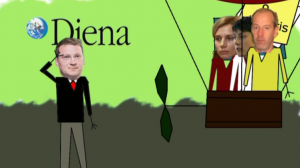RIGA — Nearly two decades since Latvia established freedom of the press after breaking away from the Soviet Union, the media is struggling with the principle of ownership transparency.
After the mass staff walk-out from the Diena Media group Oct. 9, the question was also taken up at the Changing Media in Tomorrow’s Democracy conference last week, organized by the Centre for Public Policy Providus in cooperation with Stockholm School of Economics in Riga.
One panel discussion at the event featured the Paul Raudseps, who was the Deina opinion page editor until Oct. 9, and the Association of Latvian Press Publishers President Ivars Zariņš. The editors of Telegraf, Delfi.lv and Baltic Reports were also featured on the panel.

Latvian think-tank Providus created this South Park-style cartoon about the Diena staff walkout that supported media ownership transparency. The cartoon was shown at the Changing Media in Tomorrow's Democracy conference Wednesday. On the right side, top Diena editors Anita Brauna, Nellija Ločmele and Pauls Raudseps take a hot-air balloon out of their Diena office while managing director Alexandrs Tralmaks looks on.
Raudseps argued that media ownership transparency is very important, particularly when there is a conflict between owner’s and journalists’ views.
“It is still too early to talk about what exactly we — those who left newspaper Diena — will do. Only one week has passed. But we are sure that it is important for any media to convince its reader that it is a reliable source,” Raudseps said.
However Zariņš, whose members include Diena Media and many other major print media outlets, took a rather different opinion on the matter.
“Reader is the king. He votes with his wallet,” Zariņš said, asserting that the content is the more important to the reader than knowing the identity of a newspaper’s owner. Zariņš named two examples from Latvian press, Diena and Neatkarīgā Rīta Avīze. Under it’s previous publicly-disclosed owner Bonnier, Diena lost subscribers, while Neatkarīgā Rīta Avīze, whose owner is unknown for the public, attracted new subscribers. According to Zariņš this is the proof that Latvian public do not care about the ownership issue.
Should the state step in?
Latvian media analyst Ainārs Dimants offers a solution to the problem. If it really is the readers’ view that ownership disclosure is insignificant, than the state could regulate the media market.
“We need a new requirement for all actors in Latvian media sphere. They should be forced to disclose their owners, so that all market participants have united rules of the game,” Dimants said, a professor in media at the School of Business Administration Turība.
Given the weight of the ownership transparency issue on the country’s still budding media sector and fallout from the staff walkout at Diena, the country’s largest newspaper, the issue is likely to become election fodder next year. Unlike most Western European nations, Latvia has no long-lasting tradition of democracy or free speech regardless of its current European Union membership.
In fact, Zariņš admitted at the conference that one of the reasons why somebody wants to become a media owner is “a wish to influence processes.”












